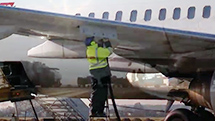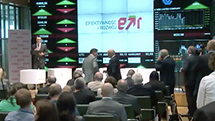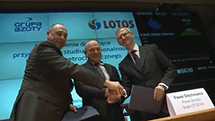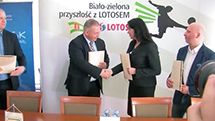Economic impact
{GRI EC9, EC6}
In accordance with our CSR strategy, we pursue long-term, comprehensive initiatives across all areas of our operations, with a particular focus on systemic approach to any issues that may occur in the organization’s business environment. By entering into agreements and contracting works with companies from the Province of Gdańsk and from the south of Poland, where some of the LOTOS Group companies operate, we have a substantial impact on the local communities, their economic development and rate of growth. We aspire to be the region’s ambassadors based on our culture of doing business, e.g. meeting liabilities in a timely manner and fostering mutual relations with suppliers by best practice sharing, support and propagation of investment technologies.
In 2013, we launched the ‘For suppliers’ sub-page of the www.lotos.pl website, with the aim of promoting the best practices, principles and values by which Grupa LOTOS abides in its dealings with prospective and existing suppliers.
Divided into several sections, the web page outlines the principles we are guided by in working with our suppliers. Along with a list of commitments, they provide an insight into the requirements and expectations we set before ourselves and before our existing and prospective suppliers, defining the values we adhere to in our activities. Visitors to the page can also study and download standard agreement forms used in dealings with Grupa LOTOS business partners, as well as General Terms and Conditions of Agreements. We have also posted there an electronic version of the LOTOS Group’s Code of Ethics, In addition, suppliers have a chance to read the currently effective CSR strategy and Misconduct Prevention Policy.
To expedite trade, protect the environment and cut down costs, we encourage our suppliers to send their invoices in electronic form, and help them correctly fill out invoices by exactly specifying the data which need to be entered in our settlement system. Thanks to easy access to a wide range of data and documents, suppliers are able to get all information they need. By sharing best practice, we impart knowledge, raise awareness and communicate regulations which govern day-to-day business dealings.
We are also aware of the importance of proper, honest business relations, which is why we settle all amounts owed to our trading partners in a timely manner. In order to control procurement costs, we assess the potential of our suppliers and make an effort to accurately estimate the cost of each order. By executing agreements with due care, we can always be sure to act in compliance with the law, including legal regulations on public levies and taxes. We expect the same of our trading partners, as reflected in the provisions of our agreements.
Our best trading practices influence the awareness of suppliers in the area of occupational health and safety, fire security, environmental protection and the supply chain. In certain cases, we take steps to ensure that our contractors settle their liabilities towards subcontractors, which is important to us both in commercial terms and as an element of our image. By selecting locally-based suppliers, we indirectly contribute to the affluence of local communities. Benefits of this policy include creation of new jobs by suppliers in the principal area of our business, reduction of the size of local grey markets and higher tax revenues for the state, which can be used to fund new investment projects, also in the
region.
We contribute to the development of small and medium-sized companies by:
- Cooperation and subcontractor services,
- Improvement of living standards in the Province of Gdańsk,
- Increase in consumer spending, including on luxury goods,
- Transfer of knowledge and experience thanks to visits of foreign contractors, subcontractors and consultants,
- Higher spending on vocational education.
In making business decisions, companies of the LOTOS Group are guided by the organization’s CSR strategy, which requires them to give due consideration to the indirect impact they may have on local communities and economic development of their respective regions. This is particularly true in the case of provinces and counties where we are the largest employer, and therefore have the ability to affect the local labour market and vocational education in fields related to the industry’s needs. Through the substantial amount of taxes we pay and our choice of trading partners, we also contribute to the development of entrepreneurship and economic potential of the communities in which we operate.
Given the nature of our operations and production facilities, we have developed precise procurement procedures, which cover both the selection of business partners and the contracting process. As a result of legal and procedural considerations, including the principle of equal treatment of all business entities, the selection of suppliers is chiefly based on their business profile, contract delivery potential, knowledge and experience, lead times and pricing. The Polish law precludes any explicit preference for local suppliers, understood as trading partners based in the provinces where companies of the LOTOS Group are located. Accordingly, local suppliers who take part in competitive bid procedures may only do so on terms equal with other bidders. Nevertheless, we keep monitoring the markets, including local markets, as a result of which we invite and select local suppliers to do business with. We evaluate them on the basis of work performed, creating a list of eligible suppliers of goods and services that meet our requirements.
To support Pomerania and our affiliation with the region, Grupa LOTOS enters into agreements concerning vehicle fleets on condition that all vehicles have Gdańsk registration plates, which has even prompted one of our contractors to open an office in Gdańsk. While perpetuating the association of the LOTOS brand with the local market, this policy enhances the municipality’s tax receipts.
We apply the most exacting quality and safety standards. Entities, including local businesses, which render services at our production facilities receive technical standards applicable to the works they are to perform, which provides them with detailed information on the relevant technologies. Also, personnel employed by those companies undergo regular, mandatory training in safety awareness.
Our trading partners are invited to meetings at which they learn about the standards and values we adhere to. For example, we have held meetings on the LOTOS Group’s Code of Ethics, as well as individual meetings with contractors with the purpose of fostering our mutual business relationships. Such meetings are an important platform for knowledge and experience sharing and an excellent opportunity to showcase the practices followed by our organization.
In order to strengthen our relationships with suppliers and to communicate our contractor selection criteria to current and potential business partners, we have developed and distributed our Code of Ethics, effective from January 2013. The fact that we forge and maintain transparent relationships brings value to both the Company and its suppliers, consistent with the ethical and social values of Grupa LOTOS.
We conclude annual contracts and framework agreements in order to contract services in the long term, without the need to constantly renegotiate the terms of business. In this way, our trading partners learn the standards of work with large business organizations, which they can then apply internally and pass on in the course of their local market operations, thus enhancing the quality of services provided. This particularly applies to SMEs, giving them an insight into the market trends, which are naturally first implemented by large organizations.
In the process of executing contracts for products and services, Grupa LOTOS takes into account all business entities, including those operating locally in the Province of Gdańsk. Purchases made with local suppliers accounted for 27% of all orders in 2013, while purchases from related entities (the Company’s subsidiaries based in Pomerania) represented 93% of total purchases from related parties.
In purchases of energy utilities, such as electricity and gas, favourable terms of business are the primary factor behind the choice of a supplier. It is worth noting that a significant amount is allocated on electricity purchases, all of which were supplied by Energa Obrót, a company based in the Province of Gdańsk, while all gas purchases, associated with PGNiG, were made in the Province of Warsaw.
In 2013, the business of LOTOS Asfalt focused on the manufacture and sales of bitumens, heavy fuel oil, bunker fuel and waterproofing materials. As these products are sold on a B2B basis, the company − by maintaining relations with its business partners − makes an indirect contribution to their development and improvement of their economic standing. The company’s activity also has an impact on employment levels in the areas where it operates, which has spurred an economic recovery in the region of Jasło, where LOTOS Asfalt has an existing bitumen plant and where, from 2009 to June 2013, it operated a Waterproofing Materials Plant. In mid-2013, the latter was sold to a new investor, who plans to develop it further and hire new staff.
Similarly, LOTOS Kolej tries to optimise its procurement processes by contracting local suppliers based in the Province of Gdańsk. This is not always possible, as in the case of spare parts for locomotives the relevant warranty provisions require the company to purchase them from suppliers specified by the rolling stock manufacturer. However, whenever it has the opportunity and permission to substitute spare parts or consumables, LOTOS Kolej always buys them from local suppliers. In other cases, when faced with a choice between prospective suppliers offering similar terms of business, LOTOS Kolej opts for local companies, because this enhances its image in the local community.
Given the nature of its activity, LOTOS Petrobaltic is not guided by the criterion of locality when selecting suppliers, doing business with both Polish and foreign partners. In 2013, the supplies of goods and services by local contractors accounted for approximately 8% of all its orders.
Also in the case of LOTOS Oil, any business entity registered in Poland will be considered a local supplier. This is due to the specific nature of the company’s activities, for which it procures raw materials (enhancing additives and other inputs needed for the production of lubricants, with the exception of base oils), packaging (to package lubricants), car cosmetics and fluids for vehicle applications.
LOTOS Kolej’s trade payables in 2013
Structure of supplies to LOTOS Oil in 2013, excluding supplies from Grupa LOTOS
In the case of repairs and maintenance work, the company prefers to employ Polish companies, which account for 90% of all related purchases. LOTOS Oil does not have its own fleet, and therefore works with many providers of forwarding and transport services. Given the location of the company’s production and distribution branches and the specific nature of supplies and services involved, it was assumed that forwarding and transport services should be contracted from local companies, defined as enterprises registered in Poland. In accordance with this definition, 100% of all forwarding and transport services for LOTOS Oil are provided by local companies. Indirectly, the company is instrumental in improving the quality of transport services on the local market by establishing procedures which have to be followed by the carriers themselves and their subcontractors (e.g. expanded checks of tanker purity, ensuring that drivers know foreign languages, strict adherence to occupational health and safety, improvement of information flow relating to the current position of transported products).
LOTOS Paliwa has a policy of purchasing almost 100% of its fuel stocks for resale from Grupa LOTOS, with the vast majority of the fuel being produced domestically, at the refinery in Gdańsk. Rail transport of fuels is handled entirely by LOTOS Kolej, also based in Gdańsk, while road transport is fully outsourced to third parties. In the case of fuel shipments to LOTOS service stations, the company works with entities with a countrywide presence. Fuel deliveries to wholesalers are additionally handled by local carriers, because they are familiar with their regions and local transport considerations. LOTOS Paliwa’s wholesale deliveries were outsourced to local freight service providers in the Provinces of Wrocław, Rzeszów, Gdańsk, Szczecin and Olsztyn. In all these cases, the services are provided by locally-based companies.






















 E-mail
E-mail Facebook
Facebook Google+
Google+ Twitter
Twitter